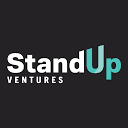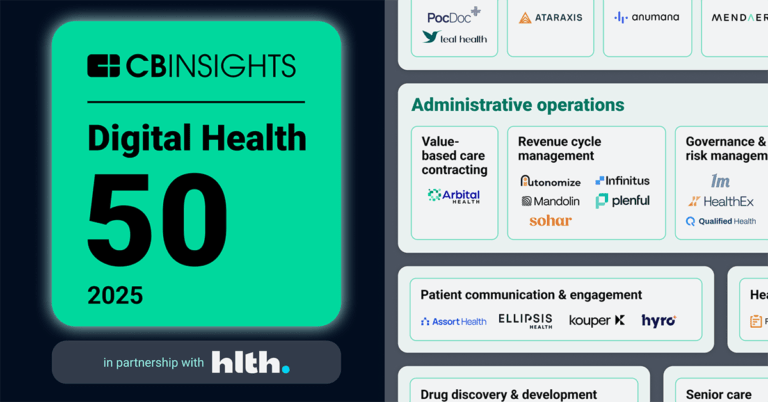
StandUp Ventures
Founded Year
2017Stage
Other Investors | AliveAbout StandUp Ventures
StandUp Ventures is a venture capital fund that invests in seed-stage companies within the technology sector, focusing on those led by women. The firm invests in for-profit technology companies that have at least one woman in a C-level leadership position and a fair share of equity ownership. StandUp Ventures supports founders in their growth from pre-seed to Series A funding stages. It was founded in 2017 and is based in Toronto, Ontario.
Loading...
Loading...
Research containing StandUp Ventures
Get data-driven expert analysis from the CB Insights Intelligence Unit.
CB Insights Intelligence Analysts have mentioned StandUp Ventures in 1 CB Insights research brief, most recently on Oct 20, 2025.

Oct 20, 2025 report
Digital Health 50: The most promising digital health startups of 2025Latest StandUp Ventures News
Apr 9, 2025
February 26th, 2025 Today, CVCA celebrated the winners of the third Canadian Women in Private Capital Awards , recognizing outstanding leaders whose contributions have shaped the Canadian private capital industry. These awards honour professionals who have demonstrated exceptional expertise, strategic vision, and leadership, driving meaningful impact within their firms and across the broader investment landscape. This morning, CIBC Innovation Banking sponsored a reception event to celebrate the achievements of this year’s honourees. The winners shared their insights on leadership, industry evolution, and the opportunities that lie ahead for the next generation of investors and dealmakers. Here are some key takeaways from their discussions. Marie-Claude Boisvert, Partner, Head of Private Equity Canada, Sagard What do you see as some of the most significant progress that has been made in terms of equity in the VC and PE ecosystem in recent years? The industry has moved beyond just aiming for “more women” and has taken concrete steps toward greater equity, including adapting some key policies to help balance parenting, professional responsibilities and ambition. Just as importantly, there have been more subtle yet powerful shifts – such as the recognition that women can thrive in private equity, build relationships with entrepreneurs, and negotiate tough deals. Successful Canadian GPs and LPs now have women represented at every level of their organizations, which provides a solid base to expect the progress regarding diversity to be sustainable in the future. What would you say to women and underrepresented groups to encourage considering a career in venture capital and private equity? Reach out to women in private equity and hear their stories firsthand — there’s no better way to understand the incredible opportunities in this industry. And importantly, invest in your career to build the right skills and background to excel in your current position as well as build your way to a successful career in private equity. What do you envision as the future of diversity, equity, and inclusion in the overall business community and society, and what actions do you believe can be taken by individuals and organizations to drive this progress forward? I’m excited to see the continued snowball effect of having more women in private equity. As more women reach senior roles, MDs and partners at GPs and LPs, there is more depth to provide women with role models and mentoring through key career milestones. Additionally, having more women at all levels creates a more inclusive environment, making it easier for future female analysts to integrate and thrive. Michelle McBane, Managing Director, StandUp Ventures What do you see as some of the most significant progress that has been made in terms of equity in the VC and PE ecosystem in recent years? There has been a tremendous amount of progress over the past few years. I see so many young women exploring a career in VC or PE, many more than in the early days when I started my career. I’ve observed that most firms have committed to expanding their pipeline when hiring for new roles and have implemented and maintained more inclusive hiring and onboarding practices. Many leaders in the private investment community have been vocal and shared their experiences and approaches. And 25 years ago, I was one of a few junior women in the industry. Now seeing all the women at various firms and the success of groups such as CWPE and Canadian Women in VC is really a testament to the chance at hand. What would you say to women and underrepresented groups to encourage considering a career in venture capital and private equity? First off, I’d say it’s one of the most rewarding professions. But it’s also a lifestyle — and I don’t mean it is a lifestyle job. It’s something that you really need to be ready to immerse yourself in. It’s also about the people that you invest in who are building the companies and doing the really hard stuff — you have to figure out how to be a good partner to them while also ensuring that our goals are aligned to build successful outcomes. So how can you get into a role at a venture fund? If you’re a student or an early graduate, work with your academic institutions and co-op programs to explore roles in VC/PE rather than the more traditional paths such as investment banking, consulting, or accounting. If you have been working for a while and have relevant experience, start having discussions to understand what a role in this field would look like. For someone interested in VC, plugging into various programs can help you get involved in the community. Volunteer with programs such as NEXT, CDL, and Venture for Canada, to name a few. Working at a startup will also give you a leg up in many cases when exploring a role in VC. The door is open wider than ever before. It’s important to understand that to be a successful VC means that you have to be open to learning constantly What do you envision as the future of diversity, equity, and inclusion in the overall business community and society, and what actions do you believe can be taken by individuals and organizations to drive this progress forward? In my mind, the ultimate goal of DEI is for an organization to bring diverse voices to the table and build the best possible products or services for its constituents. It’s about fostering a culture where differences are celebrated and everyone has the opportunity to contribute meaningfully. It’s an insight into your customer that you may not have had otherwise. There is a vibrant discussion happening right now about many aspects of DEI, and my sincere hope is that we engage in a meaningful dialogue about the future — one that retains this purpose rather than discarding everything and starting from scratch. Let’s take a moment to evaluate what has been working and what hasn’t, and remember that as Canadians, this has always been one of our core beliefs and strengths. Kristen Floro, Senior Associate, Origination, Fengate Asset Management What do you see as some of the most significant progress that has been made in terms of equity in the VC and PE ecosystem in recent years? The VC and PE ecosystem has made significant progress in advancing equity through: Representation: more women and underrepresented groups now hold leadership roles, reshaping decision-making and investment priorities. Diversity-Focused Funds: more funds are targeting minority-led businesses, providing capital to historically overlooked entrepreneurs. Accountability: firms are publicly disclosing diversity data and setting measurable DEI goals. At Fengate, we’ve seen meaningful improvements: Leadership: 63% of our executive team are women, 3 of 8 identify as visible minorities. Diverse workforce: women make up 40% of our employees. Private Equity: our PE team has grown more diverse, with 5 women joining in recent years. What would you say to women and underrepresented groups to encourage considering a career in venture capital and private equity? To women and underrepresented groups considering a career in venture capital and private equity, I’d say this: there is no single path to success in this industry — opportunity exists for those willing to carve their own way. My professional journey is proof of that. My career began in technical finance roles, transitioned to valuations and PwC’s Deals group, and in 2018, I moved into an operational and finance role in private equity before jumping to an investment role within the team at Fengate. This journey illustrates how diverse skill sets are valuable in private equity and highlights the industry’s increasing openness to unconventional backgrounds. Today, many firms are prioritizing diversity, seeking professionals who bring fresh perspectives to investment strategies and business growth. For women and underrepresented professionals, this is an exciting time to enter the field. The industry is evolving, and there is more support than ever from diversity-focused funds to mentorship programs. Success in private equity isn’t about fitting a mold; it’s about leveraging your strengths, being adaptable, and seizing opportunities to drive meaningful change. What do you envision as the future of diversity, equity, and inclusion in the overall business community and society, and what actions do you believe can be taken by individuals and organizations to drive this progress forward? The future of DEI in business will be not just be a nice to have it will be a requirement to remain competitive, drive innovation, have better decision-making, and long-term success. Studies have proven diverse teams make better decisions. Individuals can contribute by actively advocating for equity, mentoring underrepresented professionals, and challenging systemic barriers. Organizations must take a proactive approach by building inclusive cultures, investing in diverse talent and founders, setting measurable goals, and implementing DEI training. At Fengate, we have taken deliberate steps to integrate DEI into our culture and business practices: EBID (Equity, Belonging, Inclusion and Diversity) Think Tank: internal group leads DEI strategies within our firm for lasting impact. Employee Resource Groups (ERGs): provide spaces for connection, support and growth. DEI is more than metrics – it’s about creating an environment where everyone thrives. Ha Nguyen, Partner, McRock Capital What do you see as some of the most significant progress that has been made in terms of equity in the VC and PE ecosystem in recent years? We’ve seen meaningful progress in diverse representation within the industry. According to BDC’s report in November 2024, there was a 6% increase in GPs with at least one woman on the investment committee and a 13% increase in senior investment teams with at least one visible minority since 2021. Beyond the numbers, there’s also a growing wave of diverse first-time fund managers who are actively working to bridge the DEI gap in funding. Firms like Misfit Ventures, Migr8, and BKR Capital are not only backing underrepresented entrepreneurs but also reshaping the ecosystem in the process. It’s been inspiring to watch their journeys and see how the industry is evolving to support them. What would you say to women and underrepresented groups to encourage considering a career in venture capital and private equity? If you’re a woman or part of an underrepresented group, I wanted you to know that the industry needs you. You bring something truly unique: your perspective, your lived experience, your ability to see value where others might overlook it. That’s an edge. Yes, VC/PE is an industry that still skews homogenous. That means breaking in can feel daunting. But the tides are shifting. More firms are recognizing that diverse teams make better investment decisions. More networks exist to support people like you. And once you’re in, you have the power to change the game — not just for yourself, but for the founders you back and the industries you shape. So if you’re curious, lean in. Talk to people in the field. Find allies. Get your foot in the door however you can. Because when you’re in the room, the future starts to look a whole lot different — for the better. What do you envision as the future of diversity, equity, and inclusion in the overall business community and society, and what actions do you believe can be taken by individuals and organizations to drive this progress forward? I see the future of diversity, equity, and inclusion as one where it’s not just a conversation — it’s the norm. Where companies don’t have to make a case for why different perspectives matter because it’s obvious in how they operate, hire, and invest. Where people from all backgrounds feel like they belong, not because of an initiative, but because the system was built with them in mind from the start. But getting there takes work. It’s not just about policies or programs — it’s about the everyday choices we make. It’s who we hire, who we mentor, who we invest in, and how we challenge our own assumptions. For companies, it’s making sure DEI isn’t a side project but a core part of the business. And for individuals, it’s about using whatever influence we have — big or small — to open doors for others. Progress isn’t always linear, and it won’t happen overnight. But if more of us commit to making even small changes where we can, it adds up. And that’s how real change happens.
StandUp Ventures Frequently Asked Questions (FAQ)
When was StandUp Ventures founded?
StandUp Ventures was founded in 2017.
Where is StandUp Ventures's headquarters?
StandUp Ventures's headquarters is located at 101 College Street, Toronto.
What is StandUp Ventures's latest funding round?
StandUp Ventures's latest funding round is Other Investors.
Who are the investors of StandUp Ventures?
Investors of StandUp Ventures include Teralys Capital.
Who are StandUp Ventures's competitors?
Competitors of StandUp Ventures include Graham & Walker and 4 more.
Loading...
Compare StandUp Ventures to Competitors

Graham & Walker is a venture capital firm that invests in women-led technology companies. It provides venture capital investments and a fundraising readiness program for female founders. Graham & Walker serves the technology sector and focuses on companies that address human problems. Graham & Walker was formerly known as Female Founders Alliance. It was founded in 2017 and is based in Seattle, Washington.
Halogen Ventures operates as an early stage venture capital fund that invests in consumer technology companies led by women. The company provides funding and support to startups, helping them connect with advisors, investors, and accelerators. Halogen Ventures primarily invests in companies within the consumer technology sector. It was founded in 2016 and is based in Santa Monica, California.
WLOUNGE is a Berlin-based organization focused on supporting women in business and technology within the tech ecosystem. It provides services such as startup incubation, investment opportunities facilitation, and leadership programs, with the goal of increasing female representation in entrepreneurship and diversity. WLOUNGE primarily serves the tech industry, with an approach to connect and support women as role models. It is based in Berlin, Germany.
Gingerbread Capital is a venture capital firm. It focuses on investing in women-led businesses within the growth sector. The firm provides capital, knowledge, and network support to help businesses scale and succeed. Gingerbread Capital primarily serves sectors that include healthcare, technology, and environmental services. It was founded in 2016 and is based in San Mateo, California.
Female Founder Initiative is an organization focused on supporting women entrepreneurs in the technology sector. They offer educational content, events, and resources to assist female founders in starting, building, and funding their startup companies. The initiative primarily serves the startup ecosystem, aiming to increase the number of successful women-led startups. It was founded in 2016 and is based in Palo Alto, California.
WomHub is a boutique incubator and co-working hub focused on supporting female founders in the STEM sectors. The company offers co-working spaces, e-learning resources, and incubation and acceleration programs to foster women-led innovation and entrepreneurship. WomHub also provides consulting services to enhance diversity and inclusion initiatives, alongside leveraging technology and data analytics to support female entrepreneurship in engineering and tech. It was founded in 2017 and is based in Johannesburg, South Africa.
Loading...
